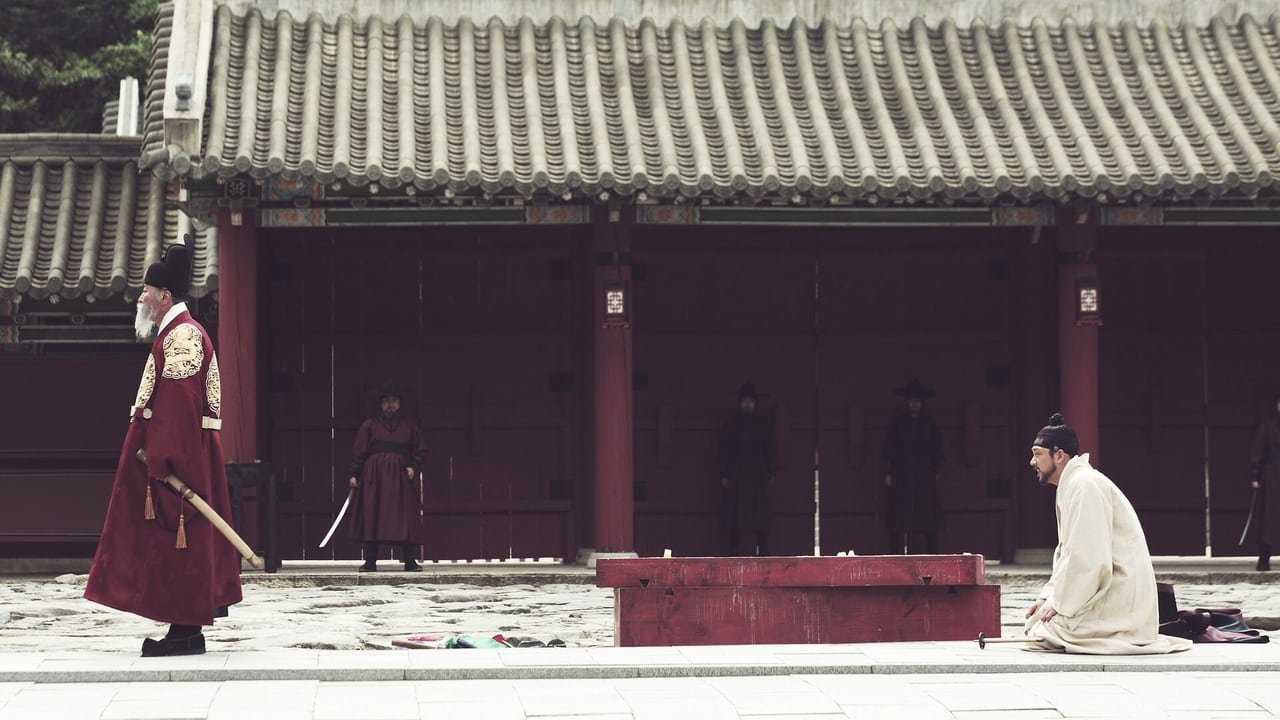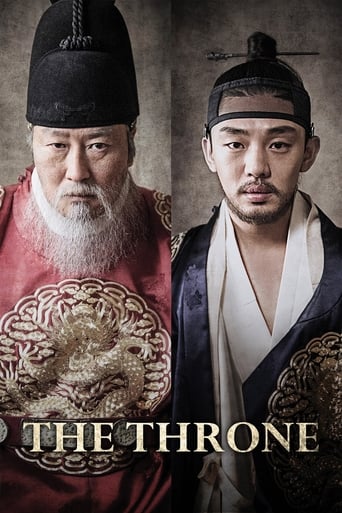

Superb acting, beautiful costuming, elaborate sets, and engrossing locations mark this powerful tale of the strained relationships that exist between all fathers and their sons.Over a period of eight days, an 18th. century Korean king punishes his only son for attempted regicide. Flashbacks reveal the chain of events that led the son to rebel against his father while the women and courtiers who love them both struggle to deal with the growing conflict.What works for The Throne is that the movie evinces a common family psychological dynamic that exists between almost all fathers and their sons, but the dynamic is amplified by the fact that the family in question is a royal family and the stakes are higher. As all fathers struggle to challenge and build their sons without breaking them and as all sons endeavor to prove themselves and earn their fathers' seemingly unattainable respect, The Throne shows us how severe that dynamic can be when the fate of an entire country is at stake.There is something for everyone in The Throne as fathers and sons might learn something about the other side's feelings and motivations while other family members and friends can relate to the helpless frustration of watching their loved ones fight each other.With all of that psychoanalysis stated, The Throne also delivers exceptionally well for viewers who enjoy lavish costume dramas about royal families and their courtiers and/or period pieces about Asian history and culture. In summary, The Throne is excellent story telling.
... View MoreMy respect goes to Yoo Ah-in (Crown Prince Sado)for his performance, though there were other quite good performances as well. I have watched many Korean films, and was surprised to have not seen Yoo Ah-in's face before, so I googled his name. He appears to have been a model before taking on acting, and rightfully so based on his good looks. Not sure if modeling came before acting, but either way, this guy is not just another pretty face actor. There were a couple of scenes in the film where his character simply commanded me to well-up. The "trivia of decorum" is a phrase that stuck with me after watching this film. The only advantage of being the first born boy to a monarch in many ancient cultures (not just Asian), was that you were at least guaranteed meals, especially if times were hard. Otherwise, the pressures on young heirs seems to have been almost unbearable.
... View MoreBy 1762, the Joseon dynasty in Korea has been in power for about 300 years, and it's managed to stay in power that long through a mixture of Confucian disciplinary skills amongst the functionaries and adherence to strict codes of behavior and style in the court. Yeongjo (Song Kang-ho) has been King for decades; his son by a concubine, Sado (Yoo Ah-in) is the Crown Prince but he doesn't follow the Confucian teachings (in fact, he hates to study at all) and doesn't adhere to behavioral norms either. When, in a fit of madness, he decides to assassinate his father, his plot is foiled and the King, unable to accuse him of high treason because that would place the dynasty in peril, decides to name him a commoner and condemn him to death. A terrible death, though, one in which the Crown Prince is placed in a sealed wooden box and left in the hot sun to slowly die of thirst and hunger. As the days pass, the story of how such a thing came to pass is told in a series of flashbacks, detailing the tragedy of this royal family . This film is based on a true incident in Korean history, one that is of huge importance in that culture because of all the social resonance it encompasses. The film is beautifully created, with sumptuous costumes and gorgeous vistas, and both lead actors are convincing in their roles. But, well, the story comes across as quite sentimental and melodramatic (just about all the various women do in the film is weep silently, although there is a memorable scene with the Dowager Queen late in the film), and frankly, at 125 minutes, it's just way longer than it needed to be. In particular, the last 10-15 minutes are quite pointless, at least to someone who is not Korean and thus doesn't have the cultural or historical background to appreciate it. I liked it overall, but it could have done with some judicious editing, I think.
... View MoreThis is a bit of a draw out movie but isn't really a slow burner movie. The pacing of it had my attention most of the way through, but after the first hour it started to get a bit stale. I did appreciate the well crafted cinematography and for it now being a amateurish movie. With bunch of corny slapstick comedy thrown in to entertain the audiences. This is a historical film based on a true story about a prince that was ordered to get locked inside a confide space until he died. Because the king didn't find his son to be worthy of the position of being king and looked forward to his grandson taking his place instead. Mainly because the son was more interested in being free and art over order and studying. Which actually seems quite familiar to the dysfunctional aspects of most families these days. With the son or daughter rebelling against the parents and the parents forcing their belief down their child's throat. The acting for the most part is superb in this and it really makes some of the drawn out scenes very watchable. So, the beginning shows the prince getting locked up and from their on it goes from flashback to flashback on how the prince lost the favor from the king and what lead to that point. This isn't a action packed historical movie with swords and arrows flying everywhere, as a matter of fact there is almost none of that. As a matter of fact there is not even a villain that causes turmoil in the kingdom. Instead it's a historical drama about the fall of a prince and how what could have been easily avoided didn't work out because of stubborn attitude and grudge. Despite the drawn out aspect of this movie the build up for the most part had some tension to it. Overall this is a film worth checking out, at least once if you like historical dramas.7.9/10
... View More